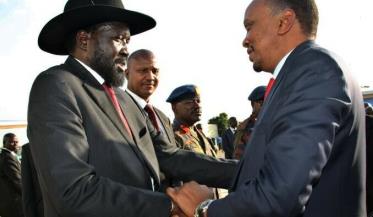Kenyan president calls for speedy resolution of S. Sudan conflict
February 27, 2014 (JUBA) – Kenyan president Uhuru Kenyatta has called for a speedy resolution to the South Sudan conflict, which has pitted pro-government forces against rebels aligned with former vice-president Riek Machar.

The Kenyan leader said the visit was to extend “support and stand in solidarity” with the government and the people of South Sudan as efforts continue to reach a peaceful settlement to the conflict.
The details of the meeting between the two leaders were not publicly disclosed, although sources close the president claimed discussions centred on the status of the remaining political detainees, as well as the need to respect the terms of the cessation of hostilities agreement, which was brokered by the regional bloc – the Inter-Govermental Authority on Development (IGAD).
The leaders also reportedly discussed the position of IGAD member countries on the resolution of the conflict, specifically the formation of an interim government that would encourage participation of all stakeholders.
“We came to share our concern about the issues that are ongoing and indeed the need for us to be able to find a speedy resolution so that the people of South Sudan get on with the more critical matters of economic and social development, which I believe is their desire,” said Kenyatta in statement broadcast by the state-owned South Sudan Television (SSTV).
“FRUITFUL DISCUSSIONS”
Kenyatta, who was flanked by president Kiir at the news conference, added that his host had expressed confidence that the recommendations put forward by the regional bloc on the cessation of hostilities agreement would be fully implemented on the side of his administration.
“We have had fruitful discussions with president Kiir and I strongly believe we have assured him our support in this particular process,” Kenyatta told journalists, adding that a monitoring mechanism of the peace process should be put in place as soon as possible.
“All these efforts are geared towards ensuring a speedy resolution of the conflict and the restoration of peace for the benefit of the people of South Sudan and stability of the whole region. When this is done we will be able to focus our energies and attentions on driving the social and economic agenda for our region forward,” he said.
This is the Kenyan president’s second official visit to South Sudan since violence erupted in the country in mid-December.
Kenyatta, who was accompanied by foreign affairs and international trade cabinet secretary Amina Mohamed and his special envoy in the peace process, former cabinet minister Dalmas Otieno, was received at Juba airport on arrival by minister of foreign affairs Barnaba Marial Benjamin.
TROOPS BOOST
His visit comes a day after the National Security Council (NSC) approved the deployment of an additional 310 troops in South Sudan in line with the UN Security Council (UNSC) resolution of 24 December 2013.
The reinforcements will bolster the 1,000 troops already in the country, which recently witnessed fresh skirmishes between warring factions despite a ceasefire agreement signed by both sides on 23 January.
IGAD has expressed concern over the renewed violence, urging parties to the conflict to immediately commit to the agreement and mediation process.
Since signing the deal both the government and rebel forces have continued to trade accusations over violations of the agreement.
It remains IGAD’s position that the South Sudan crisis cannot be solved by military means, but through political dialogue.
(ST)
